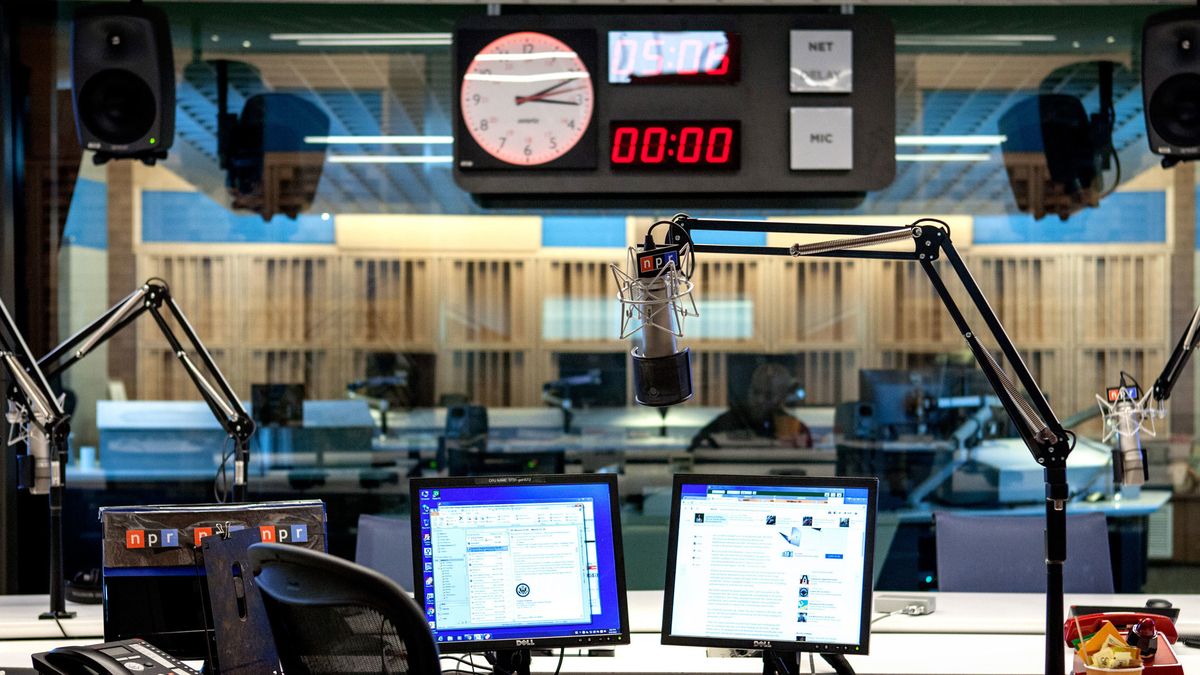Home>Devices & Equipment>Radio>How To Work At A Radio Station


Radio
How To Work At A Radio Station
Modified: March 7, 2024
Learn how to pursue a career in the radio industry and work at a radio station. Gain valuable insights and tips on starting your journey in the world of radio.
(Many of the links in this article redirect to a specific reviewed product. Your purchase of these products through affiliate links helps to generate commission for AudioLover.com, at no extra cost. Learn more)
Table of Contents
- Introduction
- Importance of Working at a Radio Station
- Skills and Qualifications Needed
- Finding Job Opportunities at Radio Stations
- Applying for a Job at a Radio Station
- Interview Preparation
- Job Responsibilities at a Radio Station
- Working Environment and Culture
- Tips for Success at a Radio Station
- Career Growth and Advancement Opportunities
- Conclusion
Introduction
Welcome to the exciting world of radio! Working at a radio station is a dream job for many music enthusiasts, radio personalities, and media professionals. It offers a unique and dynamic environment where creativity and passion for music and broadcasting come together.
Radio has been a beloved medium of entertainment, information, and communication for decades. Despite the rise of other forms of media, radio continues to hold a special place in the hearts of listeners all over the world. Its ability to engage, entertain, and connect with people is unmatched.
Whether you’re interested in becoming a radio host, producer, engineer, or any other role in the industry, working at a radio station can provide you with a fulfilling and rewarding career. From operating the soundboard to curating playlists, every position plays a crucial role in delivering high-quality and engaging content to the audience.
This article will guide you through the essentials of working at a radio station, including the necessary skills and qualifications, tips for finding job opportunities, applying for a position, preparing for interviews, and succeeding in a radio station work environment. We will also explore the career growth and advancement opportunities in this fascinating industry.
So, if you’re ready to dive into the world of radio, let’s get started on this exciting journey!
Importance of Working at a Radio Station
Working at a radio station holds immense importance for both the individuals involved and the communities they serve. Let’s explore why a career in the radio industry is significant:
1. Entertaining and Connecting with Audiences: Radio is a powerful medium that has the ability to entertain, inform, and connect with listeners in a personal and intimate way. As a radio professional, you have the opportunity to bring joy, laughter, and inspiration to people’s lives through music, storytelling, and engaging content.
2. Providing Local and Independent Voices: Radio stations often focus on serving local communities, giving them a platform to voice their opinions, share local news and events, and highlight local talent. Working at a radio station allows you to contribute to the diverse and vibrant voices that make up the community.
3. Spreading Knowledge and Awareness: Radio is a valuable source of information and education. It plays a crucial role in spreading awareness about important social issues, news, and current events. As a radio professional, you have the opportunity to shape public opinion and educate the audience on various topics.
4. Supporting the Music Industry: Radio plays a vital role in promoting and supporting artists and musicians. By featuring new music, organizing interviews and live performances, and providing a platform for emerging talent, radio stations contribute to the growth and success of the music industry.
5. Building Connections and Fostering Community Spirit: Radio has the power to bring people together, fostering a sense of community and unity. By organizing events, supporting local charities, and creating opportunities for audience participation, radio stations help strengthen the bond between listeners and their community.
6. Amplifying Voices for Change: With its wide reach and influence, radio can be used as a powerful tool for social change and advocacy. By highlighting important social issues and giving a voice to marginalized communities, radio stations have the ability to drive conversations and inspire positive action.
Working at a radio station not only allows you to be a part of a creative and fast-paced industry, but also provides you with the opportunity to make a meaningful impact on the lives of people. Whether it’s through entertaining, educating, or connecting with audiences, the importance of working at a radio station cannot be understated.
Skills and Qualifications Needed
Working at a radio station requires a unique set of skills and qualifications. While specific roles may vary, there are certain core competencies that are essential for a successful career in the radio industry:
1. Excellent Communication Skills: Strong verbal and written communication skills are crucial for effectively connecting with audiences and conveying information. As a radio professional, you should be able to articulate your thoughts clearly and engage listeners through your voice and content.
2. Voice and Presentation Skills: A pleasant and engaging voice is an asset in the radio industry. Developing good diction, tone, and modulation will help captivate listeners. Presentation skills, including speaking confidently and fluently, are also important for on-air performances.
3. Knowledge of Radio Equipment and Technology: Familiarity with radio broadcasting equipment, soundboard operation, digital editing software, and audio production tools is essential in facilitating smooth and seamless radio broadcasts. In addition, understanding streaming technology and social media platforms can enhance your ability to reach and engage a wider audience.
4. Exceptional Music Knowledge: A deep understanding and appreciation for different genres and eras of music are essential in curating playlists, selecting tracks, and delivering a music experience that resonates with listeners. Being up-to-date with current music trends and having a broad knowledge of music history will add value to your role.
5. Creativity and Content Creation Skills: The ability to develop engaging and original content is a crucial skill for radio professionals. Creating interesting segments, conducting interviews, and producing compelling stories that capture the attention of listeners require a creative mindset and storytelling abilities.
6. Time Management and Organization: Working at a radio station often involves juggling multiple tasks and deadlines. Effective time management and organizational skills are essential in ensuring smooth operations, meeting programming schedules, and delivering high-quality content.
7. Collaboration and Teamwork: Radio is an industry that thrives on collaboration. Being able to work effectively in a team, whether it’s with fellow hosts, producers, engineers, or other professionals, is important in creating a cohesive and engaging radio experience.
While a formal education in broadcasting or journalism can be beneficial, it is not always a requirement. Many successful radio professionals have built their careers through hands-on experience and a genuine passion for the medium.
Having a strong portfolio or demo reel showcasing your skills and on-air presence can be a valuable asset when applying for radio positions. Continuous learning and staying updated with industry trends through workshops, courses, and networking with other professionals can help you stay ahead in the competitive radio industry.
Remember, every role in a radio station requires a unique combination of skills. Identifying your strengths, honing your expertise, and continuously working on improving your skills will lay a solid foundation for a successful career in the radio industry.
Finding Job Opportunities at Radio Stations
When it comes to finding job opportunities at radio stations, it’s important to be proactive and explore various avenues. Here are some effective strategies to help you uncover potential opportunities:
1. Research Radio Stations: Start by researching local and national radio stations to get an understanding of the types of stations, formats, and target audiences they cater to. This will help you identify the stations that align with your interests and career aspirations.
2. Network with Industry Professionals: Networking is key in any industry, and radio is no exception. Attend industry events, workshops, and conferences to meet professionals in the field. Build relationships with DJs, producers, engineers, and other radio personnel who can provide insights and help you navigate the job market.
3. Utilize Online Job Boards and Websites: Many radio stations advertise job vacancies on their websites or through popular job boards. Regularly check these platforms for updates and apply for relevant positions. Some popular job boards specifically for the radio industry include AllAccess.com and RadioJobs.com.
4. Reach Out to Local Stations Directly: If you are interested in working at a specific local station, consider reaching out to them directly. Send a well-crafted email introducing yourself, expressing your interest in the station, and inquiring about any potential job openings. Sometimes, stations may not advertise positions publicly, so this proactive approach can give you an advantage.
5. Internships and Volunteering: Consider exploring internship or volunteer opportunities at radio stations to gain practical experience and make industry connections. Even if these positions are unpaid, they can provide valuable hands-on experience and potentially lead to future job opportunities.
6. Create an Online Presence: In today’s digital age, having an online presence is important. Create a professional website, LinkedIn profile, or online portfolio showcasing your skills, experience, and relevant work samples. This will make it easier for potential employers to find and assess your qualifications.
7. Join Professional Organizations: Joining professional organizations such as the National Association of Broadcasters (NAB) or local broadcasting associations can provide access to job boards, industry events, and valuable networking opportunities. These organizations often offer resources and support for individuals looking to pursue a career in radio.
Remember, finding job opportunities at radio stations requires persistence, patience, and a proactive approach. Don’t be disheartened by rejections and keep refining your skills and networking efforts. By utilizing these strategies, you’ll increase your chances of finding exciting job opportunities in the dynamic world of radio.
Applying for a Job at a Radio Station
Once you’ve identified a job opportunity at a radio station, the next step is to prepare and submit a compelling application. Here are some tips to help you navigate the application process:
1. Tailor Your Resume and Cover Letter: Customize your resume and cover letter to highlight relevant skills, experiences, and accomplishments that align with the position you are applying for. Emphasize your passion for radio, knowledge of the industry, and any relevant certifications or training you have completed.
2. Showcase Your Portfolio or Demo Reel: If you have a portfolio or demo reel, include it with your application. This will provide employers with a tangible example of your abilities, whether it’s hosting a show, conducting interviews, or producing content.
3. Demonstrate Your Passion and Knowledge: In your application, express your passion for radio and your understanding of the station’s target audience. Show that you are familiar with the station’s format, programming style, and brand identity. This will demonstrate your enthusiasm and commitment to the station’s mission.
4. Focus on Transferable Skills: Even if you don’t have direct experience in the radio industry, highlight transferable skills that are relevant to the position. For example, if you have experience in public speaking, event coordination, or content creation, emphasize how these skills can be applied to the role you are applying for.
5. Be Professional and Concise: Keep your application professional and concise. Use clear and concise language, proofread your documents for any errors, and avoid unnecessary jargon. Be mindful of the employer’s time and make it easy for them to quickly understand your qualifications.
6. Follow Application Instructions: Read and follow the application instructions provided by the radio station carefully. Pay attention to submission deadlines, required documents, and any specific instructions for formatting or file types. Adhering to these instructions shows your attention to detail and professionalism.
7. Follow-Up After Submitting: After submitting your application, consider following up with a polite email to express your continued interest in the position. This demonstrates your enthusiasm and can help you stand out from other applicants. However, make sure not to be too persistent or pushy.
Remember, competition can be fierce in the radio industry, so make sure to put your best foot forward. Take the time to craft a strong application that showcases your skills, passion, and potential as a valuable addition to the radio station’s team.
Interview Preparation
Preparing for a job interview at a radio station is crucial to increase your chances of success. Here are some tips to help you effectively prepare for your interview:
1. Research the Radio Station: Familiarize yourself with the radio station’s history, programming, target audience, and any recent news or events. Displaying knowledge and enthusiasm for the station during the interview will impress the hiring manager and show your dedication to the organization.
2. Understand the Position: Review the job description and identify the key responsibilities and qualifications required for the role. Use this information to prepare specific examples from your experiences that demonstrate how you meet these requirements.
3. Practice Common Interview Questions: Prepare responses to common interview questions such as “Tell me about yourself,” “Why do you want to work in radio?” or “Describe a challenge you faced and how you overcame it.” Practice delivering your answers confidently and concisely, highlighting your relevant skills and experiences.
4. Showcase Your Skills and Experience: Prepare examples that illustrate your skills and experience in relevant areas such as hosting a show, conducting interviews, audio editing, or using radio broadcasting equipment. Be ready to explain how you can contribute to the station and add value to their programming.
5. Demonstrate Your Passion for Radio: Express your passion for radio throughout the interview. Talk about your favorite radio hosts, shows, or memorable experiences as a listener. Show that you have a genuine interest in the medium and a desire to make a positive impact in the industry.
6. Dress Professionally: Dress professionally for the interview, taking into consideration the station’s brand and image. Opt for business casual attire and ensure you look polished and presentable. First impressions are important, so dress to impress.
7. Prepare Questions to Ask: Prepare a list of thoughtful questions to ask the interviewer about the radio station, the team dynamics, or the specific role you are applying for. This shows your genuine interest in the position and gives you the opportunity to learn more about the organization.
8. Practice with Mock Interviews: Consider practicing with a friend or mentor who can conduct a mock interview. This will help you refine your responses, improve your interview techniques, and build confidence in your communication skills.
9. Be Yourself and Stay Calm: Remember to be authentic and true to yourself during the interview. Stay calm and composed, and let your passion for radio shine through. Show your enthusiasm, but also listen actively and respond thoughtfully to the interviewer’s questions.
10. Follow-Up after the Interview: After the interview, send a thank-you note or email to express your gratitude for the opportunity to interview. This will leave a positive impression and reinforce your interest in the position.
By thoroughly preparing for your interview, you can showcase your qualifications, passion, and potential as an asset to the radio station. Put in the effort to research, practice, and present yourself professionally to maximize your chances of landing the job.
Job Responsibilities at a Radio Station
Working at a radio station involves a diverse range of responsibilities that contribute to the overall operation and success of the station. While specific job roles may vary, here are some common job responsibilities you may encounter at a radio station:
1. On-air Broadcasting: Radio hosts or DJs are responsible for hosting shows, engaging with listeners, and delivering entertaining and informative content. They create playlists, introduce songs, conduct interviews, and interact with callers. On-air personalities need to have a captivating presence, excellent communication skills, and the ability to connect with their audience.
2. Producing and Editing Content: Producers are responsible for creating and editing content for radio shows. They plan and organize segments, schedule interviews, and coordinate music selection. Producers also edit pre-recorded content and ensure smooth transitions between segments.
3. Sound Engineering: Sound engineers operate the technical equipment in the studio, ensuring high-quality audio during live broadcasts. They monitor sound levels, balance audio inputs, and troubleshoot any technical issues that may arise. Sound engineers may also be responsible for editing and post-production work.
4. News Reporting: Radio stations often have news departments responsible for gathering and reporting local, national, and international news. News reporters write and deliver news bulletins, conduct interviews, and provide updates on current events. They must have strong research skills, the ability to write concise and engaging news stories, and a command of the news delivery style specific to the station.
5. Sales and Advertising: Radio stations generate revenue through advertising. Sales professionals are responsible for acquiring and maintaining advertising clients. They develop advertising campaigns, negotiate contracts, and ensure client satisfaction. This role requires excellent communication and negotiation skills, as well as a good understanding of the station’s audience demographics.
6. Promotions and Events: Radio stations often organize promotional events to engage with their audience and create brand awareness. Promotions teams are responsible for planning and executing these events, including on-site coordination, managing contests or giveaways, and interacting with listeners. This role requires strong organizational and interpersonal skills.
7. Technical Support: Radio stations rely on a range of technical equipment for broadcasting, including transmitters, antennas, and studio equipment. Technical support professionals are responsible for maintaining and troubleshooting this equipment. They ensure that broadcasts run smoothly, perform routine check-ups, and address any technical issues promptly.
8. Social Media and Digital Marketing: In the digital era, radio stations also have a significant online presence. Social media and digital marketing professionals are responsible for managing the station’s social media accounts, engaging with the audience, creating digital content, and implementing digital marketing strategies to expand the station’s reach and attract new listeners.
It’s important to note that these responsibilities can overlap, and different roles within a radio station often require teamwork and collaboration. The specific job responsibilities will depend on the size, format, and structure of the radio station.
When considering a career in radio, it’s helpful to identify the specific job responsibilities that align with your interests and skills. Whether you are drawn to hosting shows, working behind the scenes, or contributing to the technical aspects, the diverse world of radio offers various opportunities to pursue your passion.
Working Environment and Culture
The working environment and culture at a radio station can be dynamic, fast-paced, and full of energy. Here are some key aspects of the working environment and culture you may encounter:
1. Collaboration and Teamwork: Radio stations thrive on collaboration and teamwork. Whether it’s working together to produce a show, brainstorming creative ideas, or troubleshooting technical issues, teamwork is essential in delivering high-quality content and ensuring smooth operations.
2. Adaptable and Flexible: The nature of radio requires adaptability and flexibility. Schedules can change, breaking news may need immediate attention, and unexpected situations may arise. Radio professionals need to be quick on their feet and able to adapt to evolving circumstances.
3. Fast-Paced and Deadline-Driven: Radio operates on tight schedules and tight deadlines. Shows must start and end on time, commercials need to be played promptly, and news bulletins need to be delivered precisely. Working in this fast-paced environment requires efficiency, organization, and the ability to work well under pressure.
4. Creativity and Innovation: Radio encourages creativity and innovation. There is room for experimentation and the development of new and exciting content. Radio professionals are often given the freedom to express their creativity and explore unique ideas to engage and captivate the audience.
5. Passion for Music and Broadcasting: A deep passion for music and broadcasting runs through the veins of most radio professionals. Working in an environment where you can share your love for music, discover new artists, and connect with listeners who appreciate the medium fosters an inspiring and enthusiastic atmosphere.
6. Sense of Community: Radio stations often have a strong sense of community, both within the station itself and with their listeners. There is a shared goal of connecting with and serving the local community, promoting local events and talents, and fostering a sense of belonging among listeners.
7. Continuous Learning: The radio industry is constantly evolving, with advancements in technology, changes in audience preferences, and new broadcasting techniques. Keeping up with industry trends and technologies is essential, and radio professionals are encouraged to embrace continuous learning and stay updated with the latest developments.
8. Work-Life Balance: While radio can be demanding, many stations understand the importance of work-life balance. Efforts are often made to accommodate schedules, facilitate time off, and support the well-being of employees. This balance allows radio professionals to maintain their passion and enthusiasm while prioritizing their personal lives.
It’s important to note that the working environment and culture can vary between different radio stations. Some may have a more formal corporate culture, while others may foster a more relaxed and creative atmosphere. Understanding the specific culture of the station you are applying to is crucial in determining if it aligns with your work preferences and goals.
Overall, working at a radio station offers an exciting and vibrant environment where passion for broadcasting, creativity, and teamwork come together. It’s a profession that provides opportunities for growth, connection, and the ability to make a meaningful impact on the lives of listeners.
Tips for Success at a Radio Station
Working at a radio station can be an exciting and rewarding experience. To thrive and succeed in this dynamic industry, consider the following tips:
1. Develop Strong Communication Skills: Effective communication is essential in the world of radio. Hone your verbal and written communication skills to engage listeners, interact with colleagues, and deliver compelling content. Practice delivering clear, concise, and engaging messages that resonate with your audience.
2. Embrace Change and Adaptability: Radio is an industry that constantly evolves. Stay open to change, embrace new technologies and broadcasting techniques, and adapt to the shifting preferences of your audience. Being adaptable and flexible will allow you to thrive in the ever-changing radio landscape.
3. Stay Updated with Music and Industry Trends: Keep up with current music trends, emerging artists, and industry news. Stay connected to popular music platforms, attend music events, and engage with fellow music enthusiasts. A deep knowledge of music will help you curate engaging playlists, connect with listeners, and contribute to the growth of the station.
4. Continuously Learn and Improve: The radio industry offers a wealth of learning opportunities. Take advantage of training programs, workshops, and industry conferences to enhance your skills and stay up-to-date with industry best practices. Seek feedback from colleagues and mentors to identify areas of improvement and invest time in honing your craft.
5. Network and Collaborate: Building a strong network of industry contacts can open doors for new opportunities and collaborations. Attend industry events, join professional associations, and engage with fellow radio professionals. Collaboration not only stimulates creativity but also allows you to learn from others and expand your horizons.
6. Manage Time Effectively: Radio demands efficient time management. Develop a system for prioritizing tasks, meeting deadlines, and organizing your workflow. Plan ahead, delegate when necessary, and maintain a balance between short-term demands and long-term goals.
7. Embrace Feedback and Constructive Criticism: Be open to receiving feedback and constructive criticism. Actively seek out opportunities to grow and improve. Take feedback as an opportunity for learning and use it to enhance your skills and performance.
8. Foster a Positive Work Environment: Cultivate a positive work environment by fostering good relationships with colleagues, maintaining professionalism, and supporting a collaborative and inclusive culture. A positive work environment motivates and inspires, contributing to your personal growth and the success of the radio station.
9. Embody Professionalism and Reliability: Demonstrate professionalism, reliability, and accountability in all aspects of your work. Arrive on time, meet deadlines, and deliver excellent quality work consistently. Act with integrity, maintain confidentiality, and conduct yourself in a manner that reflects positively on yourself and the radio station.
10. Maintain a Balance Between Passion and Self-Care: Passion for radio is essential for success, but it’s also important to prioritize self-care. Radio can be demanding, so make sure to take care of your physical and mental well-being. Find ways to recharge, practice self-care activities, and maintain a healthy work-life balance.
By following these tips, you’ll be well-equipped to navigate the intricacies of the radio industry and position yourself for success. Remember to stay passionate, adaptable, and committed to your personal and professional growth.
Career Growth and Advancement Opportunities
The radio industry offers a multitude of career growth and advancement opportunities for motivated individuals. Here are some avenues to consider for advancing your career in the exciting world of radio:
1. On-Air Personality: As an on-air personality, you can grow your career by honing your skills, developing a unique style, and increasing your audience reach. Consistently delivering engaging content, building a loyal following, and expanding your presence on social media platforms can lead to higher-profile opportunities and increased visibility in the industry.
2. Production and Programming: Within the production and programming department, you can advance by taking on roles with increased responsibility. This can include becoming a senior producer, programming director, or content manager. Demonstrating a knack for creativity, innovation, and successfully curating engaging content can help you progress in this field.
3. Station Management: Advancement into station management involves overseeing the overall operations of the radio station. This can include roles such as program director, operations manager, or general manager. Strong leadership, strategic thinking, and business acumen are important qualities for these positions.
4. Sales and Advertising: In the sales and advertising department, you can progress from an entry-level sales position to a sales manager or director role. Effective client relationship management, meeting revenue targets, and demonstrating a deep understanding of the market and audience demographics are key factors for advancement in this field.
5. News and Journalism: For those passionate about news reporting and journalism, career growth can include becoming a news anchor, news director, or managing editor. Developing strong reporting and storytelling skills, expanding your industry connections, and staying abreast of current events and trends can pave the way for increased opportunities.
6. Technical and Engineering: In the technical and engineering department, you can progress from an entry-level technician to a chief engineer or technical director. Continuing education and certifications in advanced technologies, demonstrating expertise in troubleshooting and maintaining broadcasting equipment, and taking leadership roles in technical projects can facilitate your career growth.
7. Digital Media and Online Content: With the growing influence of digital media, there are abundant career growth opportunities in managing online content, social media strategies, and digital marketing. Advancement can involve roles such as digital content manager, social media manager, or digital marketing director. Staying ahead of digital trends, mastering analytics tools, and developing creative online campaigns are key factors for success in this area.
8. Entrepreneurship and Independent Broadcasting: If you have a passion for independent broadcasting, you can explore starting your own radio station or podcast network. This path requires a strong entrepreneurial spirit, business acumen, and the ability to build and engage with your own audience.
Remember, networking, continuous learning, and honing your skills are important for capturing career growth opportunities in the radio industry. Embrace new technologies, stay up-to-date with industry trends, and actively seek out new challenges and responsibilities. With dedication, perseverance, and a strong passion for radio, you can carve out a successful and fulfilling career in this vibrant medium.
Conclusion
Working at a radio station is an exhilarating and fulfilling experience that allows you to connect with audiences, share your passion for music, and contribute to the cultural fabric of your community. The importance of working in the radio industry cannot be understated, as it offers a unique platform for entertainment, information, and community engagement.
Throughout this article, we have explored various aspects of working at a radio station, from the skills and qualifications needed to finding job opportunities, applying for positions, and navigating interviews. We have also discussed the responsibilities, working environment, and potential career growth opportunities within the industry.
To succeed in the radio industry, it is essential to have a strong foundation of communication skills, adaptability, and a deep passion for music and broadcasting. Embracing creativity, continuously learning, and fostering a positive and collaborative work environment are key in enhancing your contributions and personal growth.
Whether you aspire to be an on-air personality, a producer, a sound engineer, or any other role within the industry, the radio world offers a myriad of opportunities for growth and advancement. Networking, building industry connections, and staying updated with the latest trends and technologies will be invaluable on your journey.
Working at a radio station is not just a job, but a way of life. It is an industry that thrives on passion, creativity, and the ability to connect with listeners. As you embark on this exciting career path, remember to stay true to yourself, nurture your skills, and enjoy the incredible experience of being a part of the captivating world of radio.











